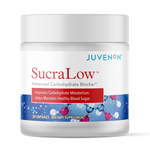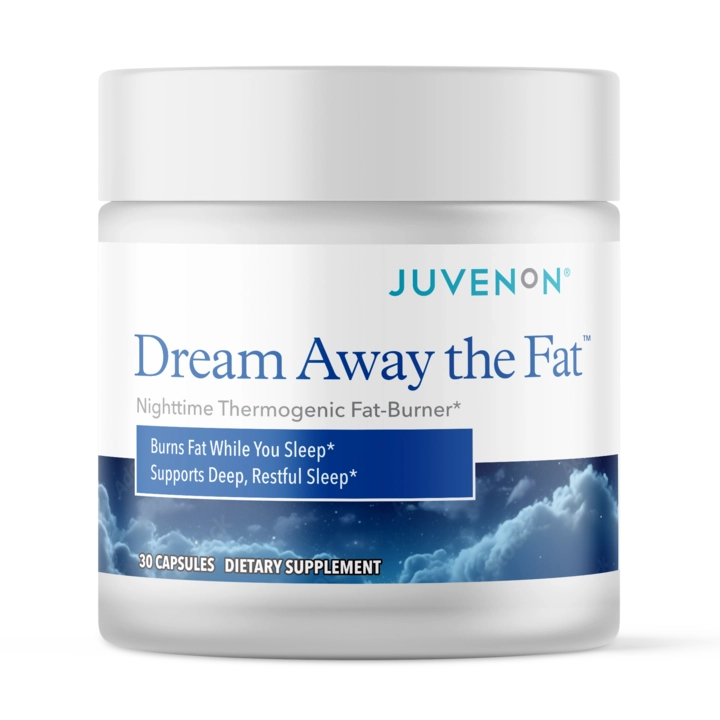Overactive thyroid is a complex condition that can have a huge impact on blood pressure health. In this article, we’ll examine what overactive thyroid is, how thyroid hormones affect blood pressure, and ways to support healthy blood pressure with an overactive thyroid.

What does it mean to have an overactive thyroid?
The thyroid is the butterfly-shaped gland at the base of the throat. It is responsible for producing three main hormones: T4, T3, and calcitonin. These hormones help regulate several bodily functions, from metabolism to heart function.
When a person has an overactive thyroid, it means their thyroid is producing too many thyroid hormones. Excess thyroid hormones can speed up bodily functions and trigger the immune system, resulting in a number of health complications.
Pay attention to these tell-tale signs of an overactive thyroid:
- Heart palpitations
- Unexplained weight loss
- Itchy skin or rashes (especially on the shins)
- Heat intolerance
- Vision Issues
- Enlarged, bulging lump at base of neck
- Poor immune health
- Irritability
- Excess perspiration
- Muscle weakness
- Sleep problems
- Changes in menstruation
- Leg and foot cramps
- Jitters, stress, and inability to concentrate
While anyone can develop an overactive thyroid, women are 10 times more likely to have an overactive thyroid than men.
Is an overactive thyroid preventable?
Unlike many health ailments that have a clear cause, scientists are uncertain what causes an overactive thyroid.
It can be an issue in the pituitary gland of the brain (the communication center that tells the thyroid to produce hormones). It can also be a problem in the thyroid gland itself. Some speculate that an overactive thyroid can even be triggered by gut imbalances, such as a gluten intolerance.
Because of this, many experts agree that an overactive thyroid is not a preventable ailment.
This can be very frustrating for people with an overactive thyroid, and it can make it difficult to effectively address its symptoms.
Can an overactive thyroid cause erratic blood pressure?
Erratic blood pressure is a common side effect of an overactive thyroid. In fact, it’s estimated that between 36% - 59% of people who have an overactive thyroid also suffer from erratic blood pressure.
Here’s why these two ailments go hand in hand:
Because the thyroid regulates heart function, an overactive thyroid increases cardiac output, leading to elevated heart rate and spiked blood pressure.
A person with an overactive thyroid’s heart pumps hard and fast, like they’re running a marathon, even when they’re sitting still. This not only causes jitters and irritability, but also irregular heartbeat, sweatiness, and fatigue. These are often the first signs of a much more dangerous heart health issue.
The longer an overactive thyroid goes unchecked, the greater the risk of blood pressure issues and heart health problems.
Effects of erratic blood pressure on the body
Erratic blood pressure increases the risk of a number of health issues:
- Irregular heartbeat
- Narrowing of arteries that support blood flow to the heart
- Blocked blood flow to the brain
- Kidney damage
- Vision problems
- Fatigue and sluggishness
- Issues in the pancreas
- Headaches dizziness
- Breathing issues
Addressing erratic blood pressure may help improve symptoms, like heart palpitations, jitters, fatigue, and increased stress. It can also dramatically reduce the risk of serious cardiac events.
Natural ways to support healthy blood pressure
Stay Active
Maintaining an active lifestyle is great for supporting blood pressure levels. Research shows that activities like walking, hiking, jogging, swimming, and even dancing can have a beneficial effect on blood pressure health. Exercise may also support stronger blood flow to the heart, boost blood vessel health, and stress reduction — all great things for maintaining healthy blood pressure.
It is important to consult a doctor before beginning an exercise program, especially for people who have an overactive thyroid.
Eat a Low-Sodium Diet
Excess sodium in the diet can trigger spikes in blood pressure, which is why a low-sodium diet is recommended for maintaining healthy blood pressure levels.
To eat low-sodium, it’s best to avoid fast or processed foods, seasonings with high salt content, and fried foods. It’s important to stay extra vigilant when reading food labels, as there is hidden sodium in many packaged foods. Look out for words like “monosodium glutamate (MSG),” “sodium citrate,” and “sodium phosphate.”
Experts also caution against anything labeled as “low-sodium” or “reduced-sodium” because the sodium content can still be very high in these foods.
The safest route is to choose whole foods, like fresh fruit, vegetables, nuts, seeds, and sustainably sourced meats and eggs. These are the best options for people watching their sodium intake.
Practice Relaxation Techniques
Stress is to blood pressure as gasoline is to a fire. Stress can increase blood pressure quickly and uncontrollably. Finding ways to relax and destress is very important for maintaining healthy blood pressure levels.
This can be a simple mindfulness meditation that takes 5 minutes per day, a leisurely walk through the neighborhood, or a hot bath with aromatherapy oils. Reading, journaling, and creative hobbies like painting can all serve as great outlets for stress.
There are countless ways to incorporate relaxation techniques into a daily routine that don’t require a lot of time or money. Taking the time to relax can make all the difference in blood pressure health.
Natural supplements to help maintain healthy blood pressure
Supplements are a great option for people who want an extra level of support in maintaining healthy blood pressure levels.
When it comes to blood pressure supplements, the key is to use supplements that can help support blood pressure once it’s in a healthy range — and keep it there.
Blood Pressure Protocol by Juvenon does exactly that. Featuring best-selling BloodFlow-7® and ThymoGel®, Blood Pressure Protocol is a natural, two-pronged system for maintaining healthy blood pressure levels.
BloodFlow-7® is designed with natural ingredients to help support healthy blood pressure levels:
- Made with beetroot extract, Trans-Resveratrol, and superfood blend S7 (featuring heart-healthy kale, blueberries, turmeric, and more)
- Shown to boost nitric oxide by 230% — key for improving blood flow
- Shown to expand arteries by 69% for optimal circulation
- Supports healthy blood pressure levels, more energy, and better heart health
ThymoGel® is designed with one superstar ingredient that helps people consistently maintain healthy blood pressure levels:
- Made with ThymoQuin — the world’s most powerful black seed extract
- Helps maintain consistently healthy blood pressure levels over time
- Supports arterial health for better blood flow throughout the body
These two supplements together are a one-two punch to support healthy blood pressure levels. Plus, they are easy to use, gentle on the stomach, and more affordable than many options out there.
Click here to learn more about Blood Pressure Protocol by Juvenon.
Final Thoughts
Erratic blood pressure is a common side effect of an overactive thyroid, so it is important to maintain healthy blood pressure levels. Keeping an active lifestyle, eating a low-sodium diet, and minimizing stress when possible can support healthy blood pressure levels.
Supplements can be a great way to get extra support to maintain healthy blood pressure. The Blood Pressure Protocol by Juvenon is a science-backed supplement duo. Each supplement is clinically recommended for its ability to help maintain healthy blood pressure levels over time. Plus, they are both made with natural, rigorously studied ingredients.
While an overactive thyroid may not be preventable, there are ways to support a better quality of life with the ailment. Maintaining healthy blood pressure can help people feel better, stronger, and more in control of their health while dealing with an overactive thyroid.
Sources:
Berta, E., Lengyel, I., Halmi, S., Zrnyi, M., Erdei, A., Harangi, M., Dénes Páll, Nagy, E. V., & Bodor, M. (2019). Hypertension in Thyroid Disorders. InFrontiers in endocrinology (Vol. 10, pp. 482–482). Frontiers in endocrinology. https://doi.org/10.3389/fendo.2019.00482
Grillo, A., Salvi, L., Coruzzi, P., Salvi, P., & Parati, G. (2019). Sodium Intake and Hypertension. InNutrients (Vol. 11, Issue 9, p. 1970). Nutrients. https://doi.org/10.3390/nu11091970
Healthdirect Australia. (2024). Thyroid gland. Inwww.healthdirect.gov.au. https://www.healthdirect.gov.au/thyroid-gland
How to Read a Food Label to Limit Sodium: Care Instructions. (n.d.). Inmyhealth.alberta.ca. Retrieved May 16, 2024, from https://myhealth.alberta.ca/Health/aftercareinformation/pages/conditions.aspx?hwid=ug3824
Leo, S. D., Lee, S. Y., & Braverman, L. E. (2016). Hyperthyroidism. InLancet (London, England) (Vol. 388, Issue 10047, pp. 906–918). Lancet (London, England). https://doi.org/10.1016/S0140-6736(16)00278-6
Overactive thyroid (hyperthyroidism). (2017). Innhs.uk. https://www.nhs.uk/conditions/overactive-thyroid-hyperthyroidism/
ScienceDirect. (n.d.). Retrieved May 16, 2024, from https://www.sciencedirect.com/science/article/pii/S2666396120300029
The Best Exercise to Lower Your Blood Pressure? It’s Not What You Think It Is. (2023). InColumbiaDoctors. https://www.columbiadoctors.org/news/best-exercise-lower-your-blood-pressure-its-not-what-you-think-it
[4] https://www.sciencedirect.com/science/article/pii/S2666396120300029
[5] https://www.ncbi.nlm.nih.gov/pmc/articles/PMC6652798/
[7] https://www.ncbi.nlm.nih.gov/pmc/articles/PMC6770596/
[8] https://myhealth.alberta.ca/Health/aftercareinformation/pages/conditions.aspx?hwid=ug3824






















